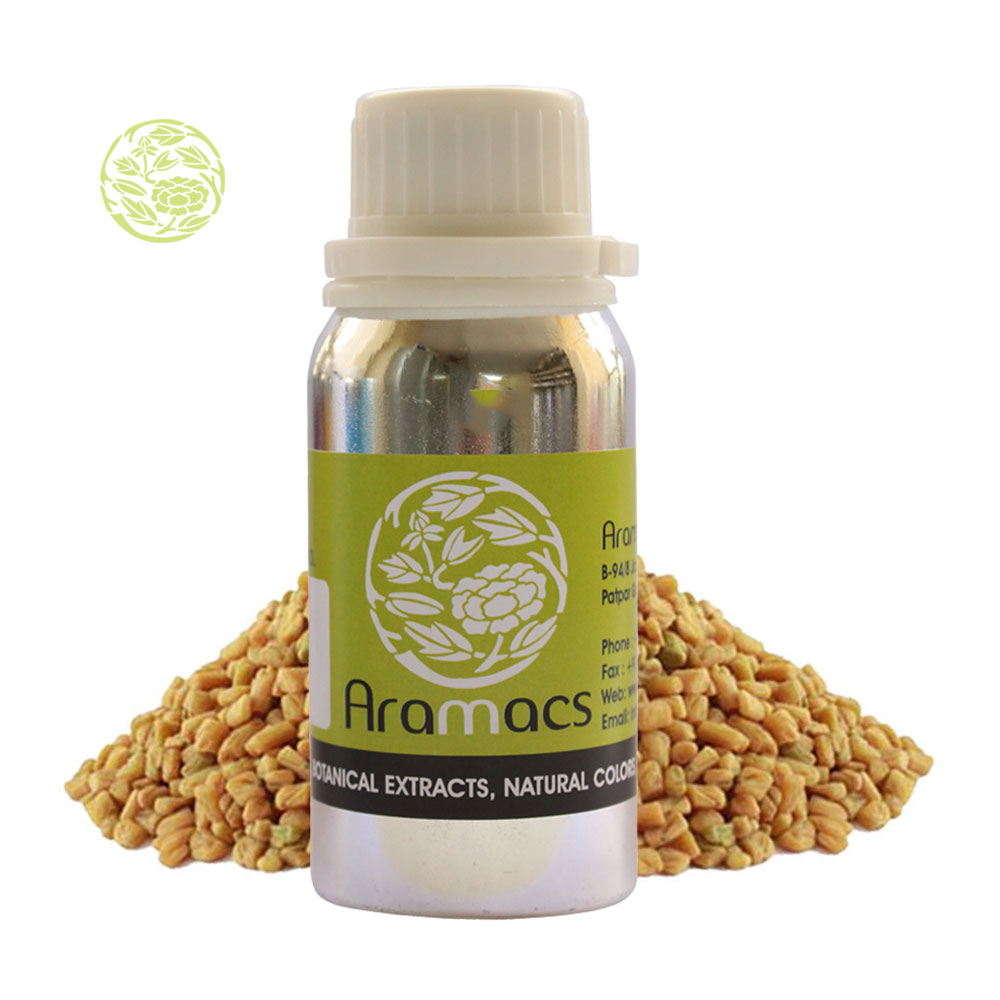Fenugreek Extract

English name: Fenugreek Extract
Botanical name: Trigonella foenum-graecum
Introduction
The botanical name of Fenugreek Oleoresin is Trigonella foenum-graecum and it is light brown coloured and free flowing liquid. It is soluble in oil and it has a typical aroma of the roasted fenugreek. The major constituents are the volatile oil and alkaloids. The fenugreek oleoresin is derived from the dried ripe seeds of Trigonella foenum-graccum and the seeds of fenugreek contain 50% fibre and out of which 20% is mucilaginous fibre. Fenugreek oleoresin contains proteins, saponins and possesses nutritive and restorative properties and it does not contain fibre. Fenugreek is known for its antiseptic, expectorant, carminative, laxative, diuretic, stomachic and stimulant properties. It is widely used for flavouring food and also as a tobacco fragrance.
Healing Powers
Fenugreek is also known as Greek Hay-seed, methi and Bird’s foot. Oleoresin is easily soluble in oil but insoluble in water. The saponins and proteins present in the Fenugreek oleoresin have healing and nutritive powers. Since the Fenugreek oleoresin contains much essential oil it is widely used for flavouring food items. It is used for flavouring butter which increases the taste of butter. Fenugreek oleoresin is used for enhancing curry flavour and it gives maple flavours when used in syrups. Some of the pharmaceutical companies use fenugreek oleoresin for progesterone production.
Good for Digestion
The density of fenugreek oleoresin at 200C is 0.935-0.975 and the refractive index is 1.4670 -1.4970. Fenugreek oleoresin is known to aid in digestion and is an emollient and is widely used in poultices for boils, cysts and other similar complaints. It is a very good expectorant and contains mucilagins which soothes and relaxes inflamed tissues, relieves congestion, reduces inflammation and fights infection by alleviating cough etc. It stimulates perspiration to reduce fever and is good for treating allergies and bronchitis.
Fenugreek help control diabetes and the seed is known for helping control blood sugar and decrease insulin resistance. The fenugreek oleoresin fights against certain types of cancer cell lines and the seeds help lower the bad cholesterol level or LDL in the human body. The seeds have flavonoids called maringenin which lower the lipid levels in those with high cholesterol. Fenugreek oleoresin has anti-inflammatory and antioxidant properties which help reduce pain caused by arthritis. Arthritis is a problem which causes inflammation in one or more joints and this creates severe pain more than the regular wear and tear of the joint muscles. Consuming fenugreek seed is good for the function of the kidneys because it have polypenolic flavonoids which improves the functions of the kidney and prevent the weakening of the cells by forming a membrane around the kidneys.
Protection for Liver
Fenugreek provides full protection for the liver. Liver cleanses the body of toxins and any injury to the liver means there is serious threat to your health. One of the reasons for the liver problems is excessive alcohol consumption and fenugreek seeds are effective in controlling the impact of alcohol on the liver. The fenugreek seeds provide full protection to the liver from alcohol toxicity. The polyphenolic compounds present in fenugreek seeds reduce liver damage and help metabolize the alcohol.


 Call IND
Call IND  Call USA
Call USA 

